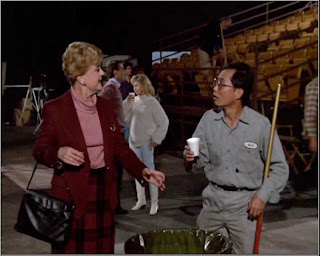Thankfully, I wasn't terribly disappointed. Of course, it's to be expected that any movie will not follow the book it's adapted from exactly, even if that book happens to be written like a TV script. (Author Suzanne Collins apparently was a television writer. Who knew?) But the movie did a pretty good job of sticking with the story and trying to include as much detail about the novel and character interactions as possible. I did find that the movie ran incredibly long, and they could've used some of the people they had on screen more effectively. But more on that later.
Anyway, that being said, there was quite a bit lost in translation. And quite frankly, given the book's writing style I had kind of thought that impossible. I didn't feel as invested in Katniss' story as I was while reading the books.
Let me go back for a minute: For those of you who haven't read The Hunger Games, (pretty much anyone over the age of 25, although with everything being Hunger Games-themed I'm sure that audience is dwindling) it's a young-adult trilogy of Katniss Everdeen, a girl living in a post-apocalyptic world called Panem, where residents of the outlying districts are forced to send two tributes, one boy and one girl, to a gladiator-type contest broadcast on national television called The Hunger Games, where they kill each other off until only one tribute remains. Oh, and the tributes must be between the ages of 12 and 18, so they're basically children. Katniss volunteers to be a tribute to save her sister, Prim, so she is sent off with her male counterpart, Peeta, to train and fight to the death in an arena. What Katniss doesn't realize is that her actions will set off a string of events that threaten to unravel the life she's always known.
Anyway, I liked the books. But that's it. I didn't think they were anything spectacular, and the writing style lacked the vigor and imagination I was hoping for. But the storyline was extremely compelling, and quite interesting. After all, how many novels are about children killing each other in arenas? The writing is from Katniss' point of view, so I had a great time imagining the arena and various characters, even if her inner monologues got tiring.
The movie did not live up to that imagination. There was more that could have been done with the characters of Cinna and Haymitch, and less with President Snow (played by Donald Sutherland, a choice I was originally not happy about but have since come to terms with.) Lenny Kravitz did a nice job as Cinna, but it was hard to really gauge his ability because he spent so little time on screen. And Woody Harrelson as Haymitch also did a good job, but again, he could've played a bigger role.
That being said, Jennifer Lawrence as Katniss and Josh Hutchinson as Peeta were excellent and got just the right amount of screen time. I particularly enjoyed Hutchinson as Peeta, and while I didn't have a specific description in mind when I was reading the books, I thought the movie adaptation was perfect.
 |
| Spoiler alert: This would be so much happier if all of the characters except the last three on the right didn't die. Photo from Vanity Fair. |
So, is this a family-friendly flick? The series is for pre-teens or teens, but I wouldn't really take my children to it. Not that it stopped anyone from leaving their 10-year-olds by themselves in the theatre. Unfortunately, this seems to be the way of the world now, and while I could go on and on about the moral decline of parenthood, I'll just say that I honestly don't think children under the age of 14 would be able to fully understand what's going on in the books and the movie(s). The undercurrents of war and politics can make for some raw emotions, and unless your junior is a boy/girl genius and/or has actually suffered the effects of war, it's hard to imagine him or her fully grasping the meaning of such a state.
Finally, my last issue with the movie was the literal headache it gave me. The camerawork seriously leaves something to be desired. I did not need to see so many different shots zooming in and out all over the place during the first minute of the movie. And the first-person camera effect (think Blair Witch Project) was completely distracting and made me nauseous. Thankfully, it was only used in one scene--perhaps the director, Gary Ross, realized it was in bad taste. The number of close shots was also overdone, perhaps in an attempt to literally draw the audience into the characters' various facial features (or flaws, if you look carefully enough and are feeling particularly judgmental) but it got very tiring after a while. So be warned.
Overall, I did enjoy the movie. I would recommend it to anyone who has read the books because it does a good job of staying true to them (I think it helps when the author is also a screenwriter for the movie), and I would recommend it to anyone who is interested in the series. I'd still say to read the books first to get a better idea of the world of Panem, but for someone who really wants to hop on the Hunger Games bandwagon, it's perfectly acceptable to see the movie and then read the books. Just don't do it around your children, unless you want to give them the stuff of nightmares.












